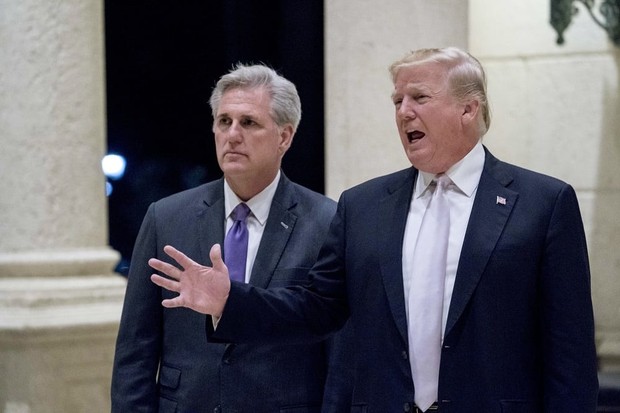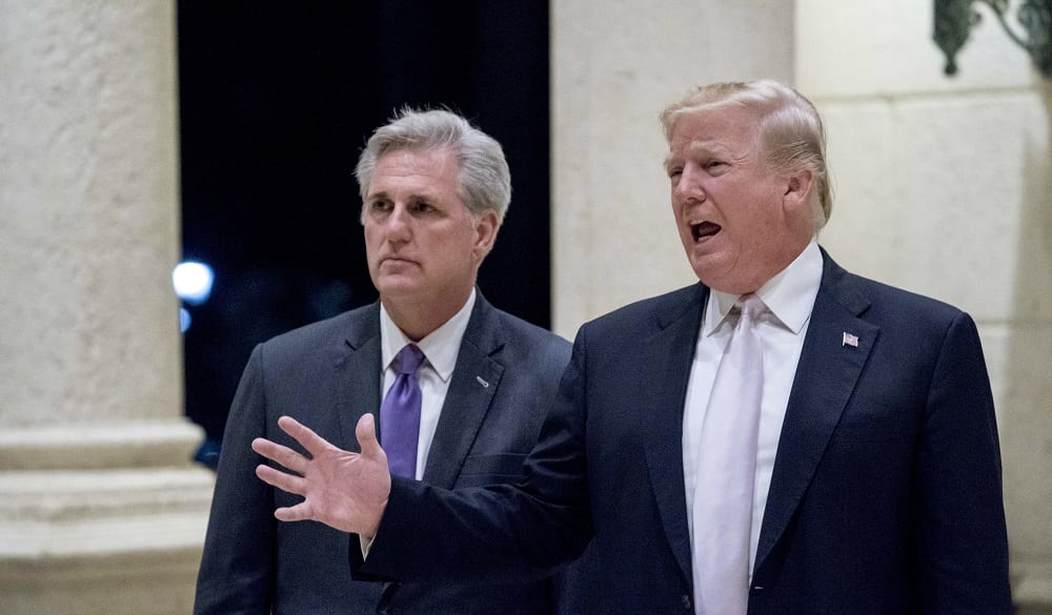
President Donald Trump, right, accompanied by House Majority Leader Kevin McCarthy, R-Calif., speaks to members of the media as they arrive for a dinner at Trump International Golf Club in West Palm Beach, Fla., Sunday, Jan. 14, 2018. (AP Photo/Andrew Harnik)
In the aftermath of the $1.3 trillion spending bill passed by the Congress in late March, the Democrats were crowing about how they had rolled the Trump administration. Like this from Chuck Schumer’s communications director:
I, for one, am tired of all the winning.
— mattwhouse (@mattwhouse) March 23, 2018
But the one certain thing in politics is uncertainty:
As Republicans run into a buzz saw of conservative criticism over a deficit-expanding new budget, GOP leaders and the White House are looking for ways to undo the damage by allowing President Donald Trump to rescind some of the spending he signed into law just 10 days ago.
Rolling back the funds would be a highly unusual move and could put some lawmakers in the potentially uncomfortable position of having to vote for specific spending opposed by a president from their party. But it would also offer Republicans a way to save face amid the backlash over the bill that conservatives, and Trump himself, complain gives too much money for Democratic priorities.
Trump has been talking with House Majority Leader Kevin McCarthy, R-Calif., about the plan over the past couple of days, according to an aide to the House leader who spoke on condition of anonymity to discuss the private talks. It is not clear how widely the idea has been embraced by other top Republicans, including House Speaker Paul Ryan or Senate Majority Leader Mitch McConnell, whose offices declined to discuss it
How could they do this? The vehicle would be the Congressional Budget and Impoundment Control Act of 1974. It was passed in the aftermath of Richard Nixon “impounding” funds appropriated by Congress. The process under the law is that the president proposes a package of cuts in appropriations. The Congress then votes on it. If the resolution passes, the cuts go into effect. If Congress refuses to vote on the bill, the spending stays. This, by the way, is how funding decisions should work.
Ordinarily, I’d pass on this as pie-in-the-sky, but the thing that intrigues me is that unlike me, the Democrats aren’t treating this as theater.
Democrats, who supported the omnibus only after receiving funds for their domestic priorities, said any GOP effort to make after-the-fact changes would be a major betrayal.
“It would completely poison the well to the idea that there can be responsible bipartisan compromise,” said Matthew Dennis, a spokesman for Rep. Nita Lowey (N.Y.), the senior Democrat on the House Appropriations Committee. The Republicans, Dennis added, are trying “to renege on elements that were critical to passage of the omnibus.”
“It’s a bill that was signed into law with Democratic and Republican votes and with the signature of the president. And they apparently didn’t like the way it played in the media afterwards, so now they’re going to try to call for a do-over,” he said.
“That’s just not how it works.”
…
“If they propose to cut important funding for early childhood education, the opioid crisis, infrastructure, public safety, and other domestic priorities, then they can expect strong Democratic opposition,” Saez said in an email.
What makes this move more than a mere mirage is the GOP looking at a brutal mid-term election which some observers think puts the control of the House in jeopardy. And you know the thought of making Schumer and others who boasted of rolling him eat crow has to appeal to Trump. A recision package would help some conservative members to rally their base…though I have to say the jury is out on whether there is actually an election-winning constituency based on cutting spending in existence.













Join the conversation as a VIP Member